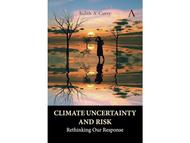Book review: Climate Uncertainty and Risk, By Judith Curry - Highlighted Article
- Posted On:
- Oct 26, 2023 at 7:00 AM
- Category
- Climate Change
From: CFACT
By: Rupert Darwall
Date: October 12, 2023
Book review: Climate Uncertainty and Risk, By Judith Curry
Just over three decades ago, the United Nations Framework Convention on Climate Change (UNFCCC) was signed by President George H. W. Bush in Rio de Janeiro. It has one objective: to stabilize concentrations of greenhouse gases in the atmosphere so as to prevent “dangerous anthropogenic interference with the climate system.” This objective incorporates three assumptions that collectively constitute a scientific and policy paradigm of climate change.
The first assumption is that climate change is caused exclusively by human emissions of greenhouse gases, principally from the combustion of fossil fuels. The second asserts that all the climate impacts from burning fossil fuels are unambiguously bad for people and the planet. The third is that the solution is the progressive—and preferably rapid—elimination of fossil fuels, requiring mankind to do without its main source of energy.
Five presidents and a generation later, this paradigm has been elevated into an overriding planetary imperative. Yet, on its own terms, the UNFCCC has failed. In the ten years before it was signed, global emissions of carbon dioxide rose from 18.88 giga-tonnes (GT) in 1982 to 22.58 GT in 1992, a decadal increase of 3.70 GT. By 2022, CO2 emissions had risen to 37.49 GT, implying an average decadal increase of 4.97 GT—a rise 34% higher than the increase in the decade prior to the UNFCCC. Despite the UNFCCC being further from its stated objective—global net-zero emissions of greenhouse gases—than when it was signed, paradoxically, the three assumptions that underpin it have hardened into unquestioned and unquestionable propositions driving the West’s futile attempt to decarbonize the global economy. Seen in these terms, the UNFCCC might well be the most consequential international agreement of all time.
Initially, these propositions did not command the universal assent of climate scientists. In its first assessment report, released in 1990, the Intergovernmental Panel on Climate Change (IPCC) observed that the average global temperature had increased by between 0.3°C and 0.6°C over the previous hundred years. “The size of this warming is broadly consistent with predictions of climate models, but it is also of the same magnitude as natural climate variability,” the IPCC declared. (contine reading)
Book review: Climate Uncertainty and Risk, By Judith Curry


